#That trait is fundamental to his character and if you take it away you take away what makes Batman Batman
Text
Actually Batman shouldn't kill. The reason he doesn't kill is because he believes wholeheartedly in the good in humanity and the sacred value of all life. His belief in rehabilitation and second chances is meant to put him in contrast with the corruption in Gotham, both with regard to the corrupt justice system/police force and the criminals, who all take lives with no regard for its value. Being surrounded by such fatal violence and corruption on a systemic level and even being affected by it on a personal level, and yet finding the strength to not only rise beyond it, but to fight for a way to fix and save the very cause of such unfathomable pain is what defines the character of Batman. Batman is about protecting the innocent and fighting against injustice so that what happened to him never happens to anyone else. Batman is about breaking the cycle of killing and rising beyond it to become a beacon of hope for a better future. Batman killing and taking justice into his own hands is literally the antithesis to his character. If your Batman kills, then he is not Batman.
#What part of killing makes you no better than the ones you are fighting do some people not get#He believes in rehabilitation not punishment#That trait is fundamental to his character and if you take it away you take away what makes Batman Batman#I'm sure everyone knows the “punisher in a funny hat” quote so please remember that again#DC#DCU#Bruce Wayne#Batman#Batfamily#Batfam#Meta#My meta#DC Comics
1K notes
·
View notes
Note
Looking for advice since you're great with stuff like this: I'm struggling with how to have a character fundamentally change. A character in my cat story loses his memory and ends up working with the main characters to stop his own plan he made to destroy the world (and after the plan is stopped, he regains his memories). I want his time in the Starless to change him, make him less obsessed with power, but I'm really starting to struggle with whether or not that makes sense and how to work that.
Hmm.. well, first bit of advice I always give is that characters are not people. They are writing tools. That doesn't mean they shouldn't be "realistic" or that connecting to the human traits in the audience isn't important.
It means that a character exists to tell a story.
By "tool" I mean "machine." Every trait is a piston, and ideally they work together to drive your story along. What are you saying with each trait? What is your beginning point for the story, and their end? What do you want to explore? What do you want the audience to take away?
So if you feel stuck on a character, find the larger message you want to impart with them. The job they're doing in your narrative.
What do you want to say about power?
What do you want to say about why Character X wanted to destroy the world? Why was he wrong? What feelings and information lead him to that conclusion?
What is his redemption arc doing for your themes?
Every writer answers those questions differently. For example, I feel strongly that power doesn't corrupt, it reveals. When you finally have the influence to make others do what you want, you make them do it. I don't see "power" as being like... a magic, abstract thing, it's influence over other people, and those people are ALSO individuals with their own reasons for following the leader.
Digressing; what I'm getting at is that, as a writer, I have a lot of thoughts on power itself. I got this way with a lot of reading and interest on the topic. You might find it insightful to experience more art, essays, and commentary on the subject, if you ever get stuck, and develop an opinion you feel strongly about.
Not just about power, as broad writing advice.
Anyway.
If I was writing the character, these are the things I'd be thinking about specifically and changes I'd be making on personal taste. I don't know your full story enough so, hopefully it's insightful;
First of all I'm always SUPER wary of the "correct but demonized radical" trope. Does my villain have a point?
Am i just giving them a Kick-a-Baby scene to make them wrong when they should be completely right otherwise
What are my themes and tone? This is VERY important. Steven Universe is about family and emotions with low stakes violence; the Diamonds are essentially abusive grandparents that Steven is coaching through intergenerational trauma. They fit the universe they're in. Jack Horner does not belong in SU.
So I'd look at Character X's purpose.
Knowing me, I'd actually take out full amnesia entirely. I have memory problems related to trauma so I'm a lot more familiar with major, important details blotting out RIGHT when I need them. Enough that I can put myself in the shoes of someone like BB!Fallenleaf who remembers a lot but the details are fuzzy.
So personally I think I could write this villan to be VERY funny lmao
"Hello. I am Gnagnathor the Destroyer."
"No you're not. He has three horns. You have two."
(DID I USED TO HAVE THREE HORNS?????)
I also just find it more resonant when a character still remembers what they did, why they did it, and is able to refute themselves with their own growth.
To me like... when a character remembers NOTHING to the point where they're not informed by their actions or history at all, how are they really still the same person?
in general though I find total amnesia uninteresting. I wish it was less popular.
What did Gnagnathor DO with his power? What did he WANT from it?
The simplest version of this I know is "Gnag was hurting and wanted everyone else to hurt too. Now that he has a happy place, he doesn't want that."
TO BE CLEAR THATS FINE. That's a REALLY common power fantasy and it's not automatically a bad story. It's popular for a reason.
Personally I feel strongly about the idea, though, that people with power don't change unless they lose it. There's no reason to.
People don't change until you break the environment that contributes to the behavior.
Especially with victims unfortunately-- the ugly truth is that a lot of problematic behaviors exist because they protected the victim from their abuser's actions. You need safety to really start to unpack that.
You can personally identify it and address it as much as you want, when your abuser starts to use That Tone you will still seize up. Just try to yank yourself back into your head when you're disassociating during a screaming session; your reward is raw distress.
That said, not all villains HAVE to have tragic motivators like that, or be ex-victims at all. Leveraging power to get what you want can be as ugly as just being taught the people you're hurting are subhuman.
Or making up justifications for why This Is a Good Thing Actually.
Some people will lash out violently when these justifications fall apart, because accepting it would mean they're Being Bad
Most people have an innate desire to Be Good. Like... the vast, vast majority of people. Some sense of morality is observable in all intelligent social animals; dolphins, chimps, elephants.
Tangentially, if you understand that people don't WANT to be bad and that the natural response to a scolding is defensiveness, you understand that convincing people of something is a LOT easier when you approach with kindness.
AND IN TURN: be wary of those who are flattering while trying to convince you of something. This is Manipulation 101.
So back to Gnagnathor
Do I want to talk about environment and how it changes him to be away from power? How traits that previously earned him wealth or influence are suddenly incredibly taboo, so he can't use them here?
On that-- HOW did he get his power in the first place? Re: I'm very wary of the "correct but demonized radical" trope.
Were his minions following him because they have serious issues and he exploited their desperation? .....are you centering the experience of the poor, sad abuser over his victims
Or are they ALL united over something important and legitimate? With the redemption of their villainous leader, how are you planning for that to frame all of their former followers?
(This is why redeeming minions is usually a lot more productive than doing it to the leader, imo. Redeeming Zuko means you can explore the familial legacy, the indoctrination of the Fire Nation's children, their justifications, the way systems make monsters out of people. Redeeming The Firelord would probably have caused Azula, one of his victims, to pick up his slack and now, suddenly, you have a VERY uncomfortable situation where Ozai is thrashing one of his abused children but Good This Time.)
(Not to mention that, again... why would he do this. He has power. He's doing what he wants and is used to this situation. It would be a numbskulled narrative choice.)
Aaaand that's about all I can say without essentially being a cowriter or editor. It's on you to figure out what you're trying to do and say here. I'm a good writer on this subject because I think about it a lot, which has lead to my strong opinions and point of view. Your art is a reflection of you.
#This is mega off topic but the question kinda reminds me of hazbin which I watched a couple days ago#I'm starting to identify why I was dissatisfied with it I think#I didn't dislike it though and I'm waiting for the next season#If only as something I enjoyed but wish could be better.#Bones gives advice
97 notes
·
View notes
Text
I don't mind Jason giving up killing for staying in Gotham reasons, I despise the idea of Jason giving up killing for moral reasons because I don't think you can do it and have it make sense for the character. Even in his Robin days, he agreed with a woman that killing a serial rapist and murderer was "putting down a mad dog", in the woman's words. Jason fundamentally is always going to prioritize victims over anything else, including the lives of perpetrators. Taking that away from him is altering a bedrock character trait.
1K notes
·
View notes
Note
But Astarion does seem to feel guilt/remorse when meeting the 7k spawns… idk it feels sometimes he does feel guilt and sometimes he’s just heartless.,
If this is in response to this post I made, then that post was in response to this and also some other fandom bullshit.
So I'm not saying Astarion doesn't feel remorse ever, but highlighting that at the core of his being, he is deeply selfish and self-serving, which a lot of fandom seems to either excuse away, or pretend is super good actually.
Here's the thing. Astarion does feel remorse ... in the Spawn ending. And obviously he feels no remorse in the Ascendant ending. So what happens with reglier ol' Asty? Well, he's not letting himself feel remorse. Because he's still not ready for it. He's still afraid of it. And like, yes! That's a totally logical thing for his character to do in that moment.
My problem is what people do next, and it's that they assume that his being this fucked up is actually an excuse to be a shithead to his victims and to others. That we should extend sympathy only to him and not to the people he's hurt.
"Well he was forced into it!" And? If I was forced into hurting someone else for my own survival, I'd still feel bad for hurting them? Most people would. I'm not saying Astarion doesn't, but that is distinctly how he acts. Which makes sense, self-defense mechanism etc etc. And stans agree that yes, he does supposedly feel guilt but he can't express it. So why do they excuse it when he instead chooses cruelty?
Again, I'm not making a moral judgment on him, he's a fictional character. I think what he does is (generally, I agree the reaction to the kids vs Sebastian is a bit odd) logical and makes sense for what he is. But pointing out those flaws of his, that were written like that on purpose, that are acknowledged flaws both in- and out-of-universe, doesn't make someone "gross" or a bad person. People disliking Astarion for his bad traits aren't automatically bad people who just don't get him.
He's a dick! He's written to be a dick! It's fine if people don't vibe with it or joke about killing him or do outright kill him! Will they miss out? Yes! But that's their perogative. People not liking Astarion, or hell, just doing something as innocuous as pointing out that he's kind of a huge asshole, are not uwu missing the point or being "gross" or whatever. They are acknowledging a fundamental and undisputable part of his character.
You can't on one hand wax poetic about how complex he is and how he lashes out because he's in such deep pain, and then take issue with people who point out how he lashes out and how it hurts others when he does so.
Speaking of, the thing about his reaction to the spawn kids? And how he supposedly feels bad but can't express it? He's all about killing them again! He wants to kill them! And when does he express remorse over both this wish and his actions toward them when he first victimized them? In the Spawn ending. The one that requires you to tell him no. Don't do that shit. It's bad. What you want is bad for you and for everyone else, even if it makes sense why you want it.
As a friend pointed out, it is kind of wild to see how life imitates art. In order for Astarion to get better, you need to acknowledge and push back against his cruelty and challenge his view of the world. That includes challenging his shitty coping mechanisms and reactions to things. And yet, it seems some people can't even do that.
You can acknowledge the complexities of his writing without using it as a cudgel against any and all criticism. And in particular, you can sympathize with him without attacking anyone who doesn't have the same level of sympathy, for usually quite understandable reasons.
Like I keep saying. Just because you understand how he acts doesn't make it somehow correct!
Anyway, sorry about that. I just had some thots because my brain is so big and full of worms.
#bg3#bg3 spoilers#astarion#bg3 fandom critical#anyway i've decided i'd rather be in a room full of people who dislike astarion for understandable reasons#than love him for real stupid ones
78 notes
·
View notes
Text
Now, don't get me wrong, by all accounts, Rayla isn't a particularly 'good' assassin. She fails to follow mission orders when she's actually given them (1x01, 1x02) and outright defies them (1x03). A lot of this is because of her own sense of morality and compassion, which is exactly what Runaan criticizes her for and what Ethari worried about.
R: Your heart isn't hard enough to do whatever it takes.


E: I told Runaan you were too good hearted for the work of an assassin, so I know you did not betray them out of malice.
However...
There is still a reason that Runaan thought she would be a good assassin. Part of that is because he's a lot like Claudia, his love for his family obscuring a more objective reality. The other part is that, other than her 'too soft' heart, Rayla has what she needs to be an assassin in terms of the skill set (her blades were at Marcos' throat) and because she doesn't always listen to said 'soft heart'. In fact, she often tries very very hard not to (see a lot of early S1 in particular).
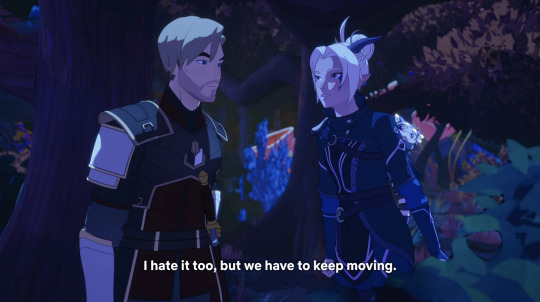
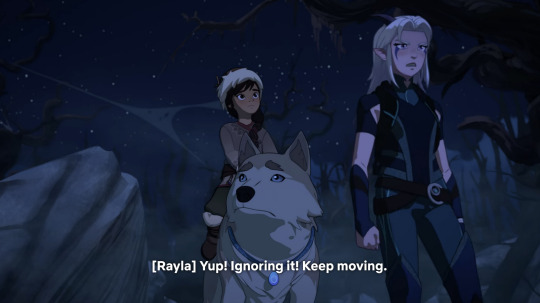



“Of course. For…” she chewed her lip and counted on her fingers. “Hrm, maybe fifteen years now. Anyway, you can call me Redfeather.”
[...] Rayla felt her heart turn soft in her chest in just the way she hated. She wanted to know more, had to know more. “What did you do?”
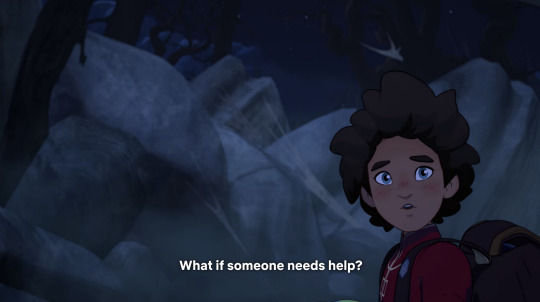

Now, we see that in S4 Rayla is a lot better at well, not listening to that soft squishy part of herself, and that Soren was less good at appealing to her about it than Ezran. Some of this is probably because he pivoted away from the dragon and went after it from an identity standpoint — which, not only does Rayla have a pretty malleable sense of self in her own head, she does not believe that any part of whatever identity is there is particularly good / does not think she's a 'Good' person quote unquote — but this was absolutely doomed to fail post-return. Spending two years alone, trying to singularly hunt down a man and murder him, and knowing all the while that you hurt the people you love the most and have nothing to show for it... Yeah, no one's gonna be in the best head space for that, or be overly inclined to trust their own judgement or capacity to save people.
Like most characters in the show, Rayla struggles with always knowing what the right thing to do is, and what served her well in the past — trusting her gut, taking on things alone, laying herself down in the line of fire, removing her hesitation, and going to save Phyrrah in 2x07 — may not always serve her well in every scenario. She thought she was right to do all the same things when she went after Viren, didn't she? So she errs on the side of inaction, of not wanting to make another mistake by acting with her heart rather her head (again), and inadvertently waltzes into another mistake (Soren being captured and going missing).
Rayla will do the right thing, and hate herself for it, and will stubbornly ignore the signs screaming at her when she isn't doing the right thing (and she'll hate herself for that, too.)
[ Sidenote: bonus post about how Arc 2 increasingly treats more and more character traits and decisions as circumstantial rather than inherently good or bad ]
As she says to Ezran:
R: I let him go. I don't know why.
E: Because you felt for him.
R: But he was a human — my enemy!
E: Yeah, but then you saw he was scared. And you knew he was a person, just like you.
R: That shouldn't have mattered. I had a job to do.
I think we can read this in two ways. The first is that to be an assassin, you have to be able to dehumanize others on a fundamental level because you're 1) murdering strangers 2) on someone else's orders. Although Runaan preaches about balance in Bloodmoon Huntress (when you kill someone, you remove their capacity for love and change) we have all of Arc 1 talking about why that mindset is flawed and isn't good enough, especially because it culminates in Harrow's death when he still had plenty of things to love, like his children, and so much he wanted to change, and it would've led to Ezran's death as well. This is one of the reasons why assassination and dark magic, conceptually, often go hand in hand for the characters and their explorations of personhood and the right thing to do, etc etc.
The second way is that Rayla, by ignoring her own wants and personhood — her own heart — is also dehumanizing herself. It shouldn't matter that she's a person with wants and weaknesses; she had a job to do. We see this reflected in a lot of her behaviour ("Don't worry about my hand. The egg is all that matters now" —> "It's agonizing. But I know our mission comes first: the world is in danger, and you can trust me to stay focused") and in Runaan's / Moonshadow elves infamous "I am already dead" thing.
(There is also the factor that, because her and Callum mutually informed the construction of each other's new senses of identity to an absurd degree, if Callum doesn't want her then she doesn't know / doesn't have a firm footing on who she is anymore without him, but that's a codependent post for another day.)
All of this is a very long winded way of saying there, much like Viren and Claudia, are two consistently contradicting aspects to Rayla's personality that she is catapulting between, and the Assassin Rayla and Protector Rayla are, as of S5, still equal parts of her as she finds her way. Both have good and bad qualities of her, even if the Assassin Rayla side is — let's say more negative — and far more worrisome given what Callum has asked her to do if he is possessed again, and how it seems like S6 will be going full steam ahead in exploring that plotline.
In a lot of ways, Assassin Rayla and Protector Rayla have the exact same set of traits — selfless, protective, strong, willing to sever close bonds or divert from the mission to do the Right Thing — but instead describe the circumstances she's making those choices in. Protector Rayla is the one who stands against Runaan on the battlements; Assassin Rayla is the one who refuses to prioritize her parents even when she absolutely could (or at least, more than she is).
Assassin Rayla causes her to forget her own needs and put the world above everything else. Assassin Rayla causes her to ignore other people's needs, either not helping them (although iirc 4x05 is the only real example of it) or by leaving / keeping secrets.
The part of her we don't want her to listen to, the part she listens to when she's Scared — the one that walks away from the drake in 4x05, that tries to walk away in 1x09, and what led to her leaving, in a lot of ways, in TTM (both out of love, trauma, and a desperate need for control) — and how S4 reaffirms those qualities is precisely what may lead her to hurting Callum (again) in S6.
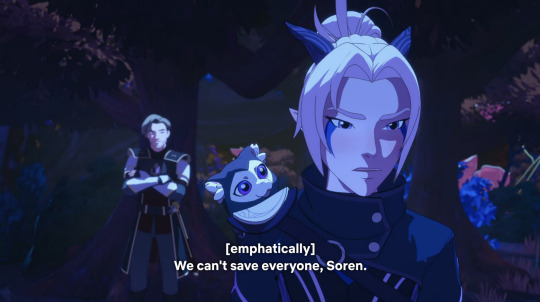
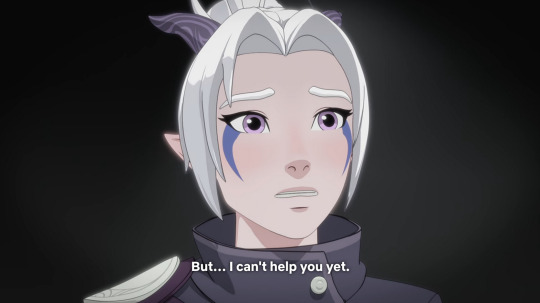

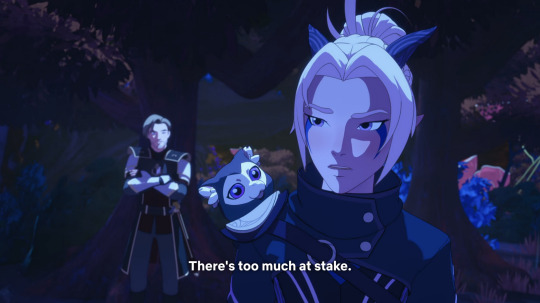
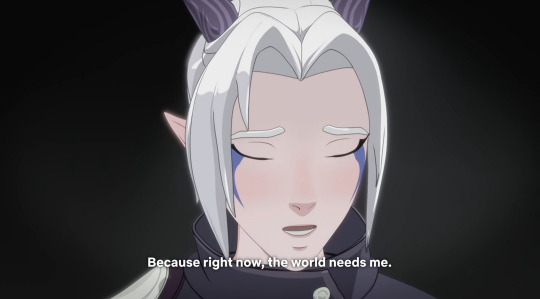

Because Callum is asking her to become an Assassin, Aaravos marks her as a failed one, and Rayla still — deep down — wants to ultimately be a Protector. We'll just have to see what side she answers to (and why).
More thoughts on Rayla, identity, and murder to follow lmao
#tdp#tdp rayla#the dragon prince#i need you to kill me#4x05#arc 2#rayla#mini meta#raylangst#theme: identity#analysis series#4x05 always gives me chills bc for literally anyone else in the main cast#leaving the dragon wouldn't be a Change#but bc rayla's such a bleeding heart it shakes us to our cores lmao#tdp meta#analysis#would u believe me if i said this was supposed to be Short#it's esp funny bc post s4 i was like 'rayla would never even try to kill him'#but post s5 on her end i'm like hONEY NO!! like i really feel like it's up in the air#of how much she'll Try now in ways it wasn't before#which is very fun#but very sad ofc
82 notes
·
View notes
Text
I think it’s really interesting how c!Tommy being an annoying little shit masks how much of a people pleaser he is when it’s also a massive part of how he tries to appeal to those around him like. He's gotten positive attention from being an obnoxious dick! People go along with what he does and help him pull dumb pranks. It’s just when he crosses the line people get mad at him, and c!Tommy's an incredibly reckless teenager- he crosses that line a lot because he hasn’t learnt it yet, he’s still pushing boundaries (which is completely developmentally appropriate for a sixteen year old, it’s Healthy and Good because it’s a part of learning how to respect them) but as far as he’s been Shown people find it funny when he’s annoying until it isn’t anymore. c!Tommy wants people to like him he wants to be helpful and funny and he thinks that being a little shit is making people laugh (because like it does) so he keeps doing it.
Like, c!Tommy is a very self conscious character in a lot of ways, it’s just hard to tell because he projects this image of cockiness. But he’s not- he has chronically low self esteem to the point he needed the discs to feel worthy of being alive even at the beginning of the server. And one of those ways he’s self conscious is that he places an unhealthy amount of value in his ability to be helpful and please others. Like, this isn’t to say he’s never a prick intentionally- he is a lot of the time, that’s Also developmentally appropriate and a Healthy and Good thing that teenagers learning social skills do. But the reason he’s “annoying at first” is because he knows about the “at first” bit. It endears him to people, at least some of them, and while he’s very emotionally intelligent and perceptive, he’s still a teenager and goes too far with it a lot.
c!Tommy is strong-willed, but that isn’t because of self confidence- it’s sheer stubborn defiance. Which is a strength in some ways- confidence can be eroded, but you can’t take away that fundamental personality trait so easily. c!Tommy is a character that shifts a lot, trying to appeal to those around him- especially those who frighten him, he has a very strong fawn instinct, as Exile shows- but he’s also a character that's got a strong and consistent personality, due to this stubbornness. He refuses to change who he fundamentally is, even if he tries to use it to seem charming and desperately try and prevent people from leaving, because he’s terrified of being alone more than anything else. His stubbornness just overpowers his fear in all but the most extreme circumstances.
Idk where I’m going with this I just think c!Tommy's a very interesting and deep character who manages to do the “totally different to how he appears on the surface” thing so well because his facade and his true self are so consistent and come from very prominent character traits even if they differ a lot. c!Tommy the Big Man and c!Tommy the insecure people pleaser feel congruent, in a way that Oh c!Dream Was Secretly A Sad Boy doesn't (and I’m saying that as someone who writes an incredibly pathetic wet cat c!Dream)
64 notes
·
View notes
Note
Hi! I saw your tags on the escape room poll that Team Liam would be last and I wanted to ask why? While I agree that they wouldn’t be first, I wouldn’t put them last either. Do you think they would just have too much conflict to use their skills?
I didn't realize this was from last night's 4SD and because OP said "Battle Royale" I assumed that it was in some way a combat-oriented escape room, in which the lack of a dedicated/significant healer (Vax has, what, 30 lay on hands and a couple low level spell slots) and the fact that Orym is one decent but not incredible tank among two of the most tissue-paper characters in terms of HP would spell their defeat.
With the understanding that this is a traditional escape room here's my thought process:
From my escape room experience there are four skills that map easily into D&D skills and one that does not map into the D&D character skill chart but does map extremely well onto players. They are:
Investigation/raw intelligence. How good are you at inspecting and comprehending things?
Sleight of Hand/raw dexterity. How good are you at manipulating objects/fine motor control?
Persuasion or Intimidation/raw charisma. How good are you at convincing people to work together or perform tasks?
Perception. How good are you at generally noticing things right away?
The most crucial thing, however, is "do you try dumb shit and push buttons and try to figure out everything quickly." And so:
Toss up between Travis and Sam's character teams in terms of the D&D skills; Chetney and Veth are both particularly suited for escape rooms between strong intelligence and high dexterity. I think Sam's team overall is probably stronger; Tary's mechanical knowledge and FCG's desire for everyone to work together and Scanlan's general buffing abilities/capacity to get people to do what he wants (presumably win) mean everyone has a lot to bring to the table. FCG is the only one with decent perception, iirc, though, and Travis as a player is fundamentally a button pusher and therefore his characters will inherit this energy even though Chetney and Fjord are going to be carrying the entire thing (although, actually, Grog will probably respond well to being asked to perform tasks or look for things).
Taliesin's characters have the combined skills but unfortunately with the except of Caduceus they all have the trait "does not work well with others" and Ashton and Percy in particular wouldn't listen to Caduceus and they're the ones with the most relevant skills here. Beau could do an escape room on her own and probably would (note: someone told me this is what Marisha said on 4SD and I agree wholeheartedly) but necessarily will be less effective than groups who work together. Vex would do pretty well and would be competitive enough, but none of Laura's characters are particularly expert in investigation and if Vex and Imogen clash it is 100% over in terms of getting out in time, though I think Jester would make a valiant go of it. None of Ashley's characters crack +1 in investigation and no one has 20 dex, and I doubt most would be interested or competitive about this, though I do think they'd get along the best by far.
Rounding things out, I suspect that Liam's characters are just behind Taliesin's in terms of conflict; it won't be quite as heated but I get the sense all three of them, all of whom are very much about working together with their respective parties, will not be very good at working together with each other, and Orym is the least likely to take the lead despite most suited for it. Caleb is extremely smart but I don't think he'd be the most invested in going super fast. I don't think they'll be last - Ashley or Taliesin are more likely - but they'd certainly not be first. The NPCs, meanwhile, have the advantage of two people who know each other well, a very agreeable and mature person in Eshteross, and Essek and Allura will probably vibe solely on the basis of being wizards who know and like Caleb if they don't know each other personally yet. Iirc Essek and Eshteross should have decent dex scores though not 20, and everyone has diplomatic skills. I believe Allura's wisdom is respectable as well. They'll certainly be the most well-behaved and adult about it.
In conclusion, you're right, probably not last (would almost certainly be last in the combat scenario I mistakenly imagined) but absolutely should not be first.
28 notes
·
View notes
Text
Keep seeing people talk about how Betty and everyone else should have loved Ice King as he was and I wanna talk about that.
Its important to mention first that there are 2 main ideas for what the crown represents within our world, addiction or dementia.
If you're going with the addiction metaphor (which I am), then to say that Betty should have accepted Simon as he was just takes away from their characters and their arc.
In elements Betty tries to do just that, get over the fact that Simon's gone now and love him as Ice King but she can't, because fundamentally Ice King just isn't simon. He's crazy and irrational and impulsive and while he shows fatherly traits (to Gunter and sometimes marcy) he isn't nearly as caring as Simon was, especially towards Betty.
Betty says it herself "being with you is like looking at my old life through a fun house mirror. It's driving me mad." Ice King being with Betty and being around Betty is actively detrimental to her mental health, and if she hadn't left when she did It would have hurt ice king too.
Because the crown represents addiction, of course its going to hurt both Simon and his friends/family, because that's what happens with addicts in the real world. For adventure time to push a narrative where everyone accepts ice king as the crazy, unhealthy and not good for anyone (besides maybe gunter) person he is would be very wrong and out of character. It'd be like saying you should accept any loved ones who do drugs as the person they are while on drugs despite the fact that person is hurting both themselves and you. It's not a good message to say the least.
It also takes away from there overall relationship and arc, Betty can't settle for a warped, different and crazy version of Simon, she loves her Simon, and if the roles were reversed it would be th exact same. That's what makes their relationship so special and tragic, they love eachother so much and are completely unwilling to let the other go even when it's the best thing for both of them. For Betty to accept and love Simon as ice king would ruin that.
(I know other characters like finn and Jake accept and befriend Simon as ice king, but that's all they've known him as. Even if they know that's not who Simon truly is, knowing Is entirely different to actually being there and seeing who Simon used to be)
I mentioned the 2 crown metaphors earlier so I'll circle back to that. When talking from a 'the crown represents dementia' viewpoint things do change a bit, which ice kings madness no longer being something horrible he brought upon himself (like addiction) but instead more of a tragic accident. However this doesn't change the fact that ice king is still unhealthy for Betty (and himself) and that her loving him would undermine both their characters and their relationship.
Though it is sweet to think about Betty loving him for who he is now, to say it should have happened and the show would be better with it is just incorrect. Also it would kinda ruin the impact if ice king turning back into Simon at the shows end.
That's all goodbye
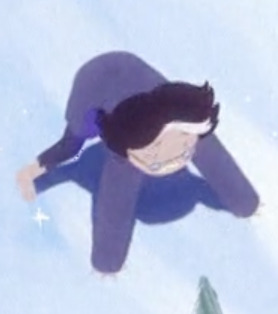
116 notes
·
View notes
Text
Thoughts and Observations From the Movie, Part 4/4
Back again one last time for whatever this nonsense compilation is!

If it isn’t immediately recognizable, this is the scene when Leo goes “what you fail to understand is that I missed on purpose”, and he stabs the leg of the mech suit Krang one is in to ensure it goes with him when he teleports to the blade he threw to the other side of the portal.
And I REALLY wanted to point out this particular shot because of the splatter. It’s kinda gory, but it further implies that the technology used by the Krang is not entirely inanimate; it’s got a biological nature entwined with the technological structure of everything. This is especially interesting to me for another sort-of theory I’ll explain later in the post.
Further content below the cut!
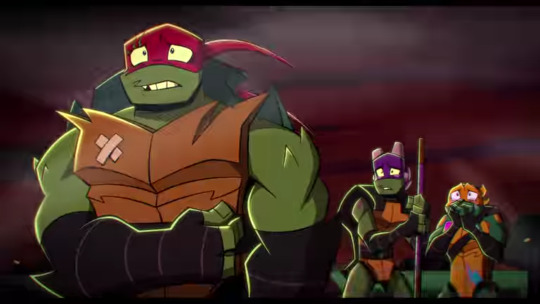
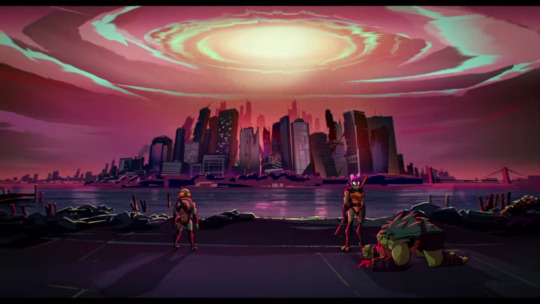

More angst! Delicious. Prepare yourselves, because I have a lot to say about this part of the movie.
Watching the way each brother reacts to what they believe to be Leo’s death sentence, effectively his death, really, given they don’t think he’ll ever exist within their reality again, is… so hard, but it shows a lot about their individual thought processes.
Mikey had his hands clasped over his mouth, fear, anxiety, and disbelief radiating off him. He’s watching that portal shut down in slow motion, already teary eyed and subconsciously trying to will away what just happened. As the portal blinks out of existence, his arms drop to his side and his posture drops and stiffens in tandem with his forefront emotions mixing and making him go numb. Now, he’s just trying to process it, pushing against the reality as it trudges through the gears of his mind, still in fight or flight mode. He’s frozen between his disbelief and the latent need to do something while grief takes the place of all that anxiety he was feeling before.
I think this actually leads pretty seamlessly into his attempts to rescue Leo. It’s established right near the beginning of the movie that Mikey holds so much faith in his family and in himself, believing that your own determination can be stronger than anything that gets in your way. It’s one of his defining character traits; such a fundamental part of who he is that they use it to help introduce him in the movie.
“According to my calculations, as long as you believe in yourself, you can do anything!”
While Mikey is stuck processing what just happened to Leo, stuck in disbelief, his emotions are warring with who he is at heart, and it’s why he goes numb until that desperation to change reality by sheer force of will comes in. Until that point, he seems to struggle a little with differentiating between what he believed should have been the outcome, and what reality was telling him.
Raph, similarly to Mikey, watched the moments before the portal closed with fear and anxiety gripping his heart. He knew and understood what Leo was doing probably better than any of them because that’s what he does. You have to consider that only ten minutes prior to this, Raph had been fighting Leo with intent to kill and no control over that.
Raph has been fighting for the entire movie, first against some low level villains, then the Foot Clan, then the Krang, then the take over of that horrible Krang biogrowth and against its mind control, and all of it, all of it, was for his brothers. This horrible thing the Krang did to him happened because he chose to protect Leo, and we all know he wouldn’t take it back for anything because his family comes first. He knows that, and he only just overcame all of it only to watch his little brother do something necessary but heartbreaking.
I think Raph felt it was his job to protect Leo. Forget who’s leader, Raph is Leo’s older brother, and none of them, being kids, should have had to do any of this, so, naturally, it’s Raph’s job to lighten the load for them as much as possible. He thinks it should have been him up there, making sure his siblings never had to bear this particular burden again. Watching someone else do what was normally his job probably leaves him feeling out of place, leaves it all feeling utterly surreal, and when it’s done and their connection to his younger brother is cut off forever, he breaks.
Everything about this is unreal, but watching Leo make a concrete decision and watching the portal close were real, and with all those thoughts about being a protector floating around suddenly having been shut down, it’s all Raph can do to fall to his knees and grieve. Beat the earth for making the worst things a reality, slam his fists for having failed to do their job, curling in on himself because his sense of self, his sense of purpose, is crumbling and he has no other way to hold the pieces together.
He will never even have the opportunity to protect Leo again.
Then, there’s Donnie. I’ve seen a lot of really good interpretations of his reaction to Leo’s sacrifice, and though it isn’t a common one I should admit I disagree with the one where the reason he’s apparently shocked by his own tears is that he doesn’t really cry. He maybe doesn’t cry super often, but Donnie is, despite appearances and behavior, actually a very emotional person, more sentimental than all his family, in some ways.
Notice that Donnie, at first, is facing the portal, and, for me at least, the expression on his face seems to convey a stream of thought composed entirely of the word “no”, over and over again. Like he’s mentally demanding “what are you doing?” and refusing to acknowledge that he knows exactly what Leo is doing, exactly what’s about to happen, and exactly what it means the rest of life is going to look like for him.
Donnie, with his highly observational and overworked thought process is analyzing every part of this situation, following the logic of Leo’s decision, looking for any other possible outcome and ruling all ideas out, one by one, as every one of Leo’s words and every element of their circumstances converge on the same result. He’s so busy focusing on the analytical perspective of all the emotion that he doesn’t realize he’s panicking, doesn’t realize it isn’t an effective method against having to feel those emotions.
So, when the portal implodes and destroys every possible future with Leo in it, changes everything about how Donnie thinks and perceives his own reality, it forces every train of thought to a stop and Donnie to confront these emotions with no logical anchor to his new reality. I think that’s why he turns around, because the longer he looks at the last remaining remnants of what took his brother, the more real that all becomes, and it’s overwhelming.
It also seems to be why he’s so shocked by his own tears. He went from being engaged with countless logical trails to follow to overwhelmingly empty in several ways-- none of which he could put words to. Finding the tears on his face and realizing that the emptiness and grief and pain were all he had in that moment, and that they were getting past every failsafe he had to keep them under control, seemed to go against the nature of his own mind and further confirmed that even looking away from what happened made it no less real.
If he was grieving already, then he couldn’t have imagined what he saw, and that’s just one more piece of logic that clears from his mind and leaves him emotionally stunned.

Okay, that was a little intense, so. Let’s change tracks 😅
Supposedly even the shape of Raph’s and Donnie’s eyes here is a nod to the shape of Leo’s, and this is such a cool thought. Leo and Raph, earlier in the series, briefly had each other’s eyes when Ninja Mind Melding, which symbolized their intense connection to one another.
So the idea that something similar is happening here has me almost giddy. It was Mikey’s desperate attempt to save Leo that triggered the formation of the portal he creates, and Raph and Donnie are just as desperate once they realize all hope is not lost. What you see with their eyes here implies that the reason making this portal was possible is not just Mikey’s mystical prowess or his desire to open a portal to the prison dimension, but the brothers’ intense and deeply emotional attatchment to Leo. The portal worked because Mikey was looking for Leo, NOT the prison dimension. And I just think that’s neat
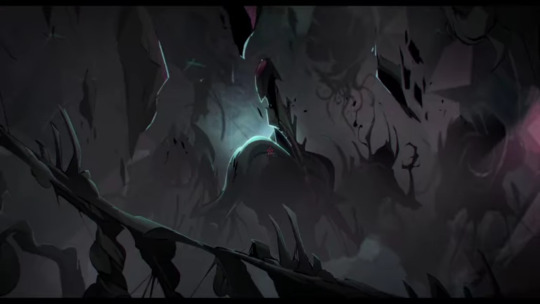
That little red-ish spot in the center of this screenshot is Krang One, still in his mech suit, which is huge in comparison to the boys. Now look at the figure behind him, and think about how massive and mech-suit-like that thing is.
I don’t have screenshots from the last episodes of the show, but remember that they found the skeleton of a Krang inside the head of the crying titan? Who happens to be ENORMOUS? Yeah, I have some thoughts and concerns alike.
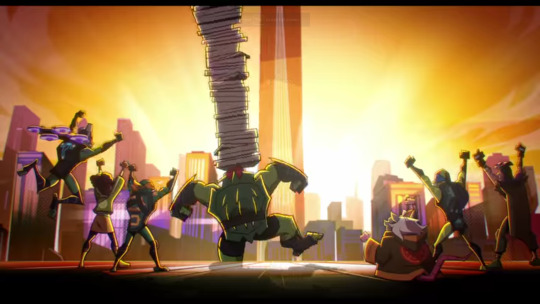
And! A final, much fluffier note to end on! Subtitles don’t show it, and it was quiet enough that I missed it the first few times I watched the movie, but here on this ending scene, actually in the moment before it shows this particular image, you can hear Donnie shout, “all right, big Raphie, let’s do it!” and I just think that’s utterly adorable.
As I’m writing this I have no idea if anyone will read any of these four posts, but if you did, thank you! I like feeling heard :3 If you have any thoughts or add ons, or if you know, like, some super obscure, unknown cool/silly detail from the movie, I’d love to hear it! Additionally, if anyone wants me to expand on any of the things I said, or if you’re curious about my perspective on other theories around these things, my ask box is always open!
Part 1 Part 2 Part 3 Part 4
#rottmnt#rise of the teenage mutant ninja turtles#rise of the tmnt#save rottmnt#save rise of the teenage mutant ninja turtles#save rise of the tmnt#analysis#theory#screenshot#rottmnt movie#rise of the teenage mutant ninja turtles movie#rise of the tmnt movie#rise leo#rise donnie#rise raph#rise mikey
174 notes
·
View notes
Text
I think something fundamental about Charles Vane, and why he is so formidable in a fight (and generally feared and respected) is there has never been a fight he's entered into where he hasn't been willing to kill his opponent or die if they beat him. When fights end and nobody dies, it's a happy sort of accident. It folds into honesty as one of his core character traits; he doesn't posture. He's not going to fight someone to show off or prove a point, he's going into it with the very real determination to either win or die.
Aha! You say. But he wins the fight with Albinus on Lumberjack Island and doesn't kill him.
Well, I say, look what it cost him to do that. The price of mercy for Albinus (Ranger Crew EP title) was he had to literally rise from the grave, metaphorically (or literally, if you want to lean into the subtle supernatural undertones of the show). It's the conclusion of his opening arc of not being who he is, and instead being who he thinks he's supposed to be. It's why he doesn't take Max away himself but asks Jack to do it, which leads to her recapture and further abuse (because Jack is unable to stop the crew where Charles may well have been able to), it's why he goes to the man who owned and abused him to beg his help and offer him payment rather than killing him outright and convincing the men there to follow him out of respect.
Incidentally I think this (never entering a fight without intending to kill or be killed, to win or die) is also why Anne is a similarly unstoppable force. And, though I love him, it's why Jack isn't in the same way, though he's certainly no pushover. Jack would enter a fight with no intention of it ending in death, Charles and Anne simply don't even think of that as a possibility
Edited to add: when he steps in to stop Teach from killing Flint, you're absolutely right in that he isn't trying to kill anyone then. But I believe he's still fully putting his life on the line in that instance as it also is a major point in a different developmental arc but I have no time for more essays today alas alas that adult life be so
#Black Sails meta#Charles Vane meta#Charles Vane#my writing#i have decided to get back on this bullshit as well i miss him#i should reblog all of my OTR headcanons/meta as well#Black Sails#Vaneglorious
24 notes
·
View notes
Text
One Piece in Review, Part 2: Into the Grand Line (Ch. 42-100)
Welcome back to my One Piece reread review. In this part, we'll be covering the rest of the East Blue saga: Baratie [ch. 42-68], Arlong Park [ch. 69-95], and Loguetown [ch. 96-100]. Previous parts can be found here: Part 1 [1-41].

A number of major shifts happen in this segment of the story and it's for this reason that I think it's one of my favorite parts. At the conclusion of Syrup Village, our protagonists graduated from unnamed, utilitarian ships to their own caravel, the Going Merry, which allows them to be intentional about where they're heading. They also adopt a symbol, the skull and crossbones topped with Luffy's signature straw hat, which foretells how they'll eventually be dubbed the Straw Hat Pirates.
The creation of a flag and the addition of a ship with personality means that they now genuinely have something like a group identity, which is going to be tested quickly. And the increased size of the ship corresponds to the scope of the conflicts and world they're going to be involved in from here on out. As such, I think this segment of the story is a marked improvement along the dimensions of conflict, characterization, and scope. The main thrust of this story segment is getting the crew ready to enter the next phase of their journey - the Grand Line.
Villains/Conflicts:
Starting with the Baratie arc, the pattern established in the first three arcs - go to a new locale, confront a local villain while pursuing specific goals, recruit a new member - starts getting shaken up in unique ways or shifts away from that formula. For instance, after adding the ship's cook Sanji, the group's membership will not increase for about 80 chapters. In general, recruitment will become a lot more sparse throughout the remainder of the series, solidifying a central cast for the time being.
Also in Baratie we find a slightly more complex struggle at work. The main villain, Don Krieg, is in the unfortunate position of being sandwiched between two of the stronger early villains of One Piece, Captain Kuro and Arlong. He's something of a redundant character, repeating both Morgan and Kuro's respective traits of "belief in rank as strength" and "utilizing deception and underhanded tactics to advance his goals." He does have some good foil aspects, inverting Zoro's willingness to recognize a loss as such and Sanji's fundamental gratitude for what others have done for him. But what Krieg really does is give us 1) a rival in pursuit of the One Piece, and 2) an insight into the terrors of the Grand Line, explaining that he lost nearly his entire massive crew and fifty ships within one week there. It's a good way of setting the stakes in anticipation of finally making the voyage into this now repeatedly-teased part of the world.
In the prelude to the typical showdown between Luffy and Krieg, the figure of Dracule Mihawk comes in to basically disrupt the whole formula and tell everyone that these little backwater spats in the East Blue are not going to last, and we're not even *close* to the ceiling of how far things can escalate. Mihawk, while an antagonist, also isn't quite a villain: he basically shows up to fuck with the Krieg pirates like Bugs Bunny tormenting the opera singer, and only gets into a conflict with the Straw Hats when Zoro does something extremely, extremely dumb prideful. This is also kind of an upset, since it sees Zoro making a stab (ha) at his dream at a surprisingly early point. But the gulf between where the crew is at now, and where they need to end up, ends up being demonstrably enormous.

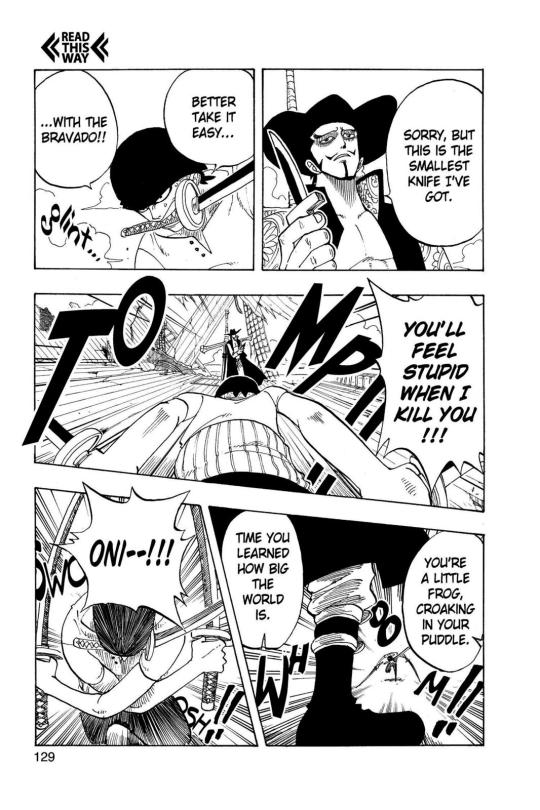
Though Krieg is a middling villain, the combined threat of him and Mihawk gives the Baratie arc its central thesis: willpower as its own kind of might. Luffy's battle against Krieg demonstrates how far willpower can take you, while Zoro's fight with Mihawk demonstrates that it's not sufficient without the force to substantively back it up. It also contrasts Zoro quite directly with Krieg, in that the latter persistently refuses to recognize when he's lost, while the former accepts defeat and (when given the opportunity to do so) learns from it, a lesson that will be necessary for taking the Grand Line seriously.
The titular antagonist of the next arc, Arlong, on the other hand, is an all-time great One Piece villain both for his place in the story now, and the long-term implications of his character as the story unfolds. The central conflicts of Arlong Park are about money, trust, and race. That last is probably the least substantively interesting right now, but becomes really fascinating later on. Arlong presents himself and his crew as "the master race," but in reality they come from a population that is socially subjected. But at this juncture of the story, we have a straightforward story about tributary exploitation. The sheer brutality of how Arlong treats the local humans he's extorting is unrivaled by anything prior to this, leaving lasting physical and psychological scars on the people. Since Arlong and his crew are explicitly presented as being products of the Grand Line, it really adds to the menace of that place.
Structurally, Arlong Park is also one of the most interesting of the early One Piece arcs, essentially split into two halves. The first is figuring out what's going on with Nami, why she's acting hostile to the others and why she's seemingly allied herself with Arlong, and reuniting the crew after a separation. This segment finds the group wheeling and dealing and clawing their way out of trouble, narrowly evading destruction by Arlong, as Nami in turn tries to push them away protectively while still preserving her plan and goals. After Nami's backstory is revealed, the story shifts into a more intense, battle-packed segment, with each Straw Hat confronting their own opponent for the first time, except for Nami, who stands alongside her community in support. They all work as a unit to overcome their opponents, learning more about how they interact and rely on each other. It has some of the genuinely most exciting and emotionally impactful storytelling in shonen manga that I've ever read.
The final arc of the East Blue saga, Loguetown, is one of many transitional arcs in the series (along with later arcs like Jaya, Long Ring Long Land, Amazon Lily, Zou, and the two "Post-" epilogue arcs). While these transitional arcs usually have their own conflicts, they are largely playing setup for upcoming ones. Loguetown is no exception, but it's the briefest of the bunch. A few key points:
Luffy gets his first bounty, 30 million beri. This is a big deal - while a lot of One Piece fans treat bounties like they represent power levels, they actually represent a social relationship between a pirate (or just an enemy of the government in general) and the World Government. With Luffy's bounty exceeding all of those he defeated so far in the East Blue, it illustrates that he's considered a substantive, if not huge, threat, and a sociopolitical indicator that he is ready for the Grand Line.
We get to see the place where the Pirate King died, but not only that, where he inaugurated a new historical epoch. This ties in heavily to another constant theme of One Piece, the idea of an inherited will: Luffy is nearly executed, and behaves in the exact same way that Gold Roger did when he was about to be executed. Visiting this place right before entering the next part of the sea suggests that Luffy is kind of picking up the spirit of Roger and starting his own legend from here on out.
We get the introduction of Captain Smoker, who is the first Marine in the series that isn't either a total bastard or a total incompetent, but remains an antagonistic force to the Straw Hats. This is used to plant the seed of different ideologies and conflict within the Marines as an institution. Smoker will be in pursuit of the Straw Hats throughout the next saga.
We get essentially the first taste of the Grand Line and what it's like: lots of Devil Fruit powers, new and strange technology, strong marine and pirate presence, major challenges, and the hint of deeper intrigue with the arrival of Dragon, who rescues Luffy from Smoker.
It's also in this series of arcs that I think we actually start to see Luffy and the crew meaningfully get challenged in terms of strength and ability. In previous situations, it was only contrivance or mistakes that got Luffy and the crew into trouble. But Krieg, while a blowhard, is definitely still a threat, whose unpredictability presents a serious challenge to Luffy (as does the environment in which they fight, as this is the first time we really get to see Luffy at risk from the tradeoff of the Devil Fruit). Arlong and his fishmen are the biggest threat that the whole crew has confronted so far, shown to be capable of upending entire villages. As fishmen, and former subordinates of a famous Grand Line pirate, they're also specifically denoted as products of the Grand Line, so confronting and successfully defeating them is an illustration of the fact that the Straw Hats are, at last, ready to enter that segment of the sea. And of course, Smoker and Mihawk outclass all of them easily for now, reminders that there is a long way to go.
Characterization:
Because of the increasing intensity and danger of the conflicts here, we get a lot more opportunities in this segment to see the Straw Hats develop and grow. In the first three arcs that I covered in the last post, the Straw Hats are visibly forming connections with each other; for instance, you can see it in the relaxed poses that Luffy and Usopp have around each other or the way the whole group drinks together. But it's only after the events of Baratie and especially Arlong Park that they begin to cohere as a group, rather than a bunch of individuals with their own self-interested goals that point in approximately the same direction. (I say "begin" because this is, as ever, a long game.)
Small or quiet character moments that were scattered throughout the previous three arcs start paying off, most notably for Nami in Arlong Park, but also for Luffy, Zoro, and Usopp. So, let's take them one by one (minus Zoro - I think I've exhausted what I have to say about him for the moment in the section on Mihawk above).
Usopp: Usopp doesn't get a lot to do in Baratie, mostly cowering on the sidelines with some minor character work, but in Arlong Park he basically has a miniature character arc which, in turn, sets up his long-term character arc. At its start, he's on some of his worst behavior, ditching Zoro potentially to die; while he has his heroic moments trying to protect Nojiko and Genzo from the Arlong crew's wrath, he repeatedly demonstrates having a somewhat blinkered view of the world, ranging from both the small (snide remarks about tattoos) to the big (his quickness to write Nami off and tendency to act rashly). It reveals a character that is struggling to understand his place in the world and the crew. At his lowest moment, when he's faked a death so that the Fishman Pirate he's fighting will leave him alone, he starts comparing himself to his crewmates, and their determination and willingness to put themselves on the line for each other.
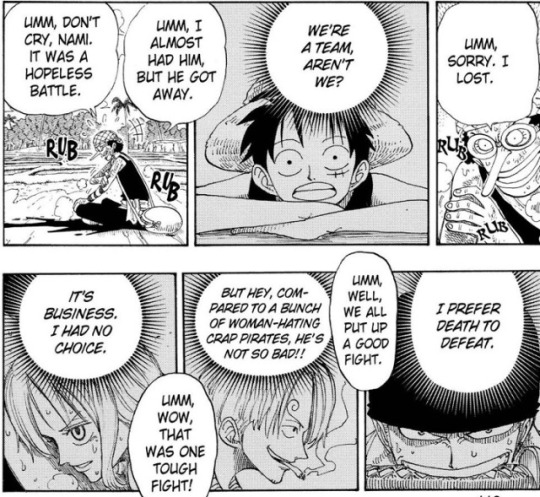
At its conclusion, we finally get to see him stand on his own two feet (literally, since Zoro had to carry him during Syrup Village) in order to defeat a powerful opponent. We also really get to see him as a fighter, which is essentially a kind of guerilla-style, improvisational, hit-and-run approach, making him stand out within the crew's battle dynamics.
Luffy: I think Luffy sometimes gets regarded as a static or at least simplistic character, especially since what his Damage is doesn't get fully exposed until right before the timeskip. But what Luffy is going through in the first half of the series is the process of learning what it is to be a captain, and how to apply his philosophy of life to the process of leadership. This is illustrated by how he is contrasted against the various captains of other crews throughout the East Blue.
At the core of Luffy's character is an ideal of freedom. When Luffy inspires other people through his convictions and dedication to his dream of becoming Pirate King, there's certainly a typical shonen "power of friendship" vibe to it, fitting for the Romantic idealism (centered around willpower and emotions) that governs the logic of One Piece. But I think it's worth noting that Luffy usually removes obstacles in people's paths towards realizing the things they care about, rather than trying to impose his beliefs and choices onto them, or directly "liberate" them. One of the first things he did on his journey is liberate Coby, an enslaved child - not by first defeating his master, but by inspiring him to overcome the mental barriers that were preventing him from pursuing his goals. Free your mind and your ass will follow.
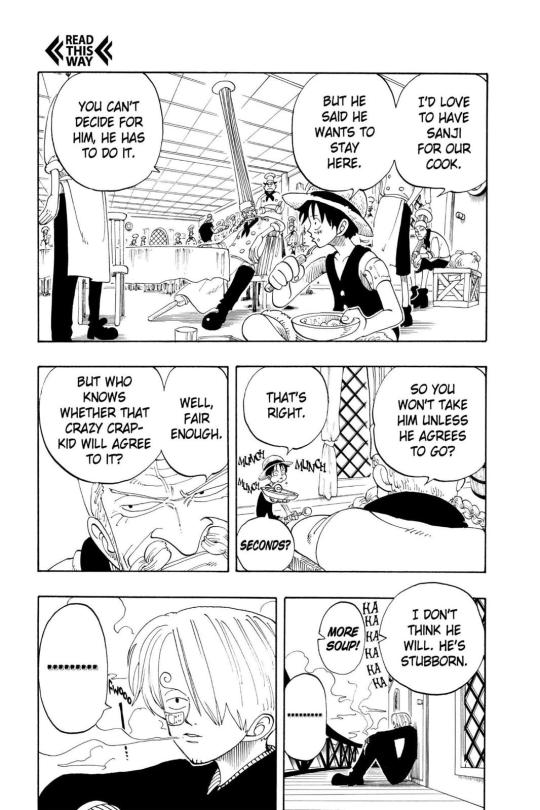
It's a recurrent element that Luffy basically does not give a shit about his friends' personal histories, and those histories are almost always presented through extended memory sequences (basically the character's internal thoughts) rather than literal explanations to other characters. Even in the rare instance where that isn't the case, like when Nojiko explains her sister Nami's personal history to Sanji, Usopp, and an unconscious Zoro, Luffy deliberately opts out. That's in part because, although *readers* need that information to give context and pathos to the characters, Luffy really doesn't. Luffy wants his friends to be able to live as they desire and that means moving forward, not back; the past, at a certain point, becomes another obstacle to pursuing one's dreams.
All four of the other main characters get inspired by the way Luffy acts and comports himself towards them in some way during this section of the story.
He disallows interference in Zoro's duel with Mihawk, but puts himself on the line after Zoro loses, demonstrating that he doesn't *just* care about his own dream but also Zoro's. This is where Zoro's loyalty to Luffy really cements, in his proclamation that he will never lose again and that Luffy is going to be the Pirate King.
He inspires Sanji to pursue his dreams by showing what it looks like to live life without regrets and to consistently put yourself on the line for your convictions, something Sanji is already familiar with but hesitant to fully embrace - and shows that sometimes causes seem more impossible than they actually are.
When Nami is at her lowest, darkest point, Luffy remains steadfast, even as she screams at him and tries to drive him away - and when, in a moment of peak vulnerability, she asks for his help and puts her trust in him out of desperation, he recognizes the pain she's been through and how hard it is for her to do so. In turn he gives her his hat to show that the relationship of trust is mutual: they can depend on each other, it is not weakness or a guaranteed loss of security.
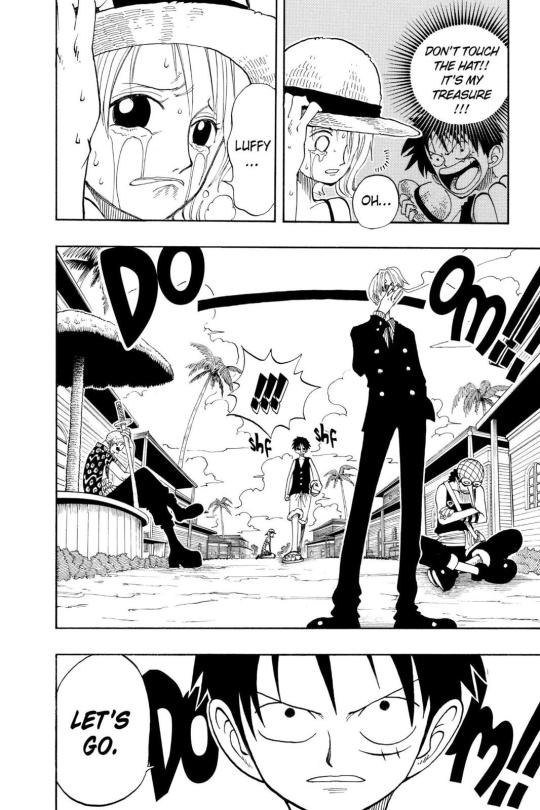
But also, Luffy is learning from them, in a way. He's learning how to be their leader.
Nami: It's only in Arlong Park that we start to understand exactly what kind of strain Nami is under, but there have been hints leading up to it. I mean, look at this face:
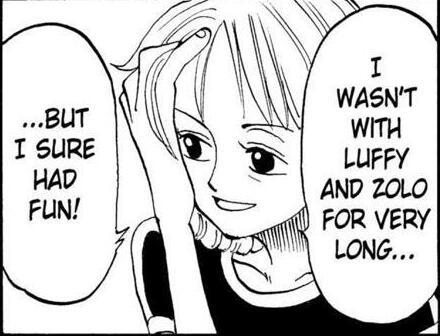
Those are the eyes of a tired woman.
Nami's whole life has been governed by money. As a child she didn't have enough of it, it was simultaneously a source of strain on her relationship with her sister and mother and an aspiration to make her dream of mapping the world possible. Then, upon the arrival of Arlong, money is the thing that tears their family apart: Bellemere doesn't have enough to pay tribute for herself and her daughters, so she makes a calculated maternal sacrifice to preserve their well-being. This was an unqualifiedly kind thing to do, but the tragic irony is that in doing so, Nami was opened up to abuse and enslavement by Arlong, who makes use of her natural talents at map-making and sets her a "task": if she can gather 100 million beri for him, she can free herself and her village.
Nami learns a variety of lessons from this course of events. Her money-lust is one - because money, in her mind, offers a guarantee of safety and security, that the things you really value won't be taken away from you. But the others are: relying on people you love will only get them killed, and if you just persist, if you just maintain the will to keep going and survive, eventually you will be free. The combination of these lessons lead her to repeatedly reject the Straw Hats from helping her or letting them into her burden. Nami believes in her own, constant self-sacrifice. While the substantive conflict of Arlong Park is about defeating the evil pirate lording over innocent villagers, the thematic and structural conflict is for Nami to learn that she doesn't have to hold onto these beliefs.
There are some complaints that circulate about how Nami doesn't take an active role in the final fight. Given Oda's inconsistent habit of sidelining female characters from the action (and it is inconsistent), I understand the concern. But I actually really like this choice in this case. Because Nami has been fighting. For eight years she has scraped her way towards freedom, getting shot and risking imprisonment or death and serving someone who could and would crush her sister's skull on a whim if he wanted to. She banked everything on a plan that gave her a semblance of control, that wouldn't require her to ask for help because doing so would just get people she cares about killed. And when it turns out that the plan can be disrupted by corruption and half-truths, she breaks. Her footing has been pulled out from underneath her, so now she has to take a leap of faith, and put her trust in others.
At the end of it all, she has a scar from where Arlong's tattoo was on her. Arlong influenced her deeply, for good and ill, and it's impossible to let go of that history entirely. But in the process she forges a new tattoo: a pinwheel and a tangerine, symbols of her mother and her community leader/father figure, a representation of how she's forging a new path for herself.
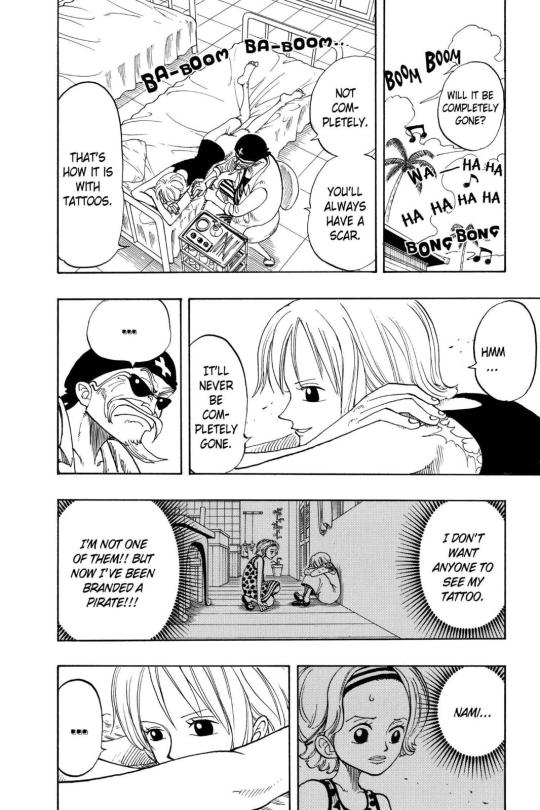
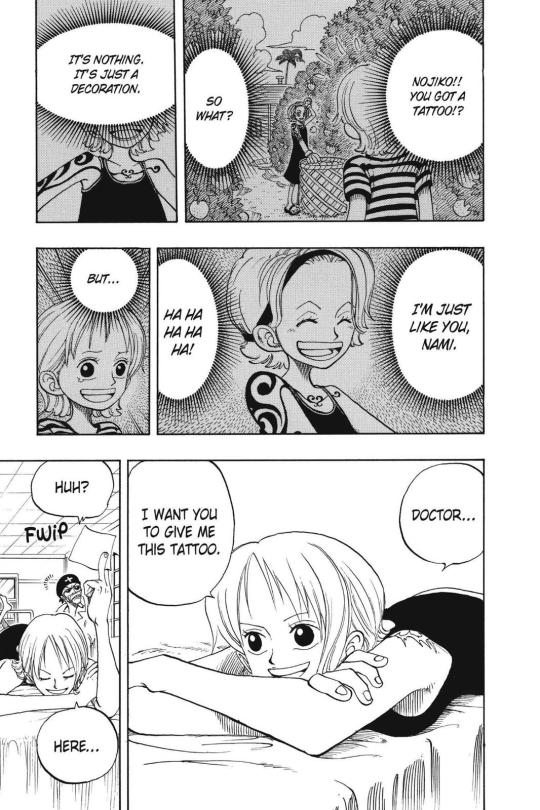
Sanji: Then there's the new introduction, the crew's cook. Sanji is a character that inspires a lot of mixed feelings in people. We will definitely get to the problems he presents down the line, but at this point in the story, I think Sanji is actually my second-favorite character in the crew after Nami. Like the rest of the crew, he has some notable vices, namely a tendency towards womanizing and "lovesickness" (which will get boiled down for jokes into 'perversion' as the series goes on, frustratingly) and a uniquely hot head even compared to Luffy and Nami. At the same time he's capable of tremendous compassion, effortlessly witty and suave (at least when he's not distracted), and demonstrates great tactical intelligence, like when he deduces the fish-man Kuroobi's weakness in the middle of a literally high-pressure scenario.
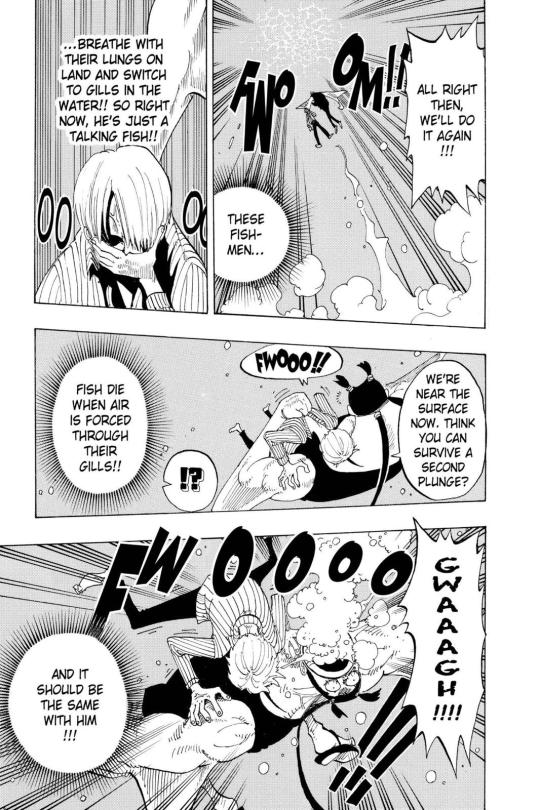
But as with many of the core cast's virtues and vices, they are rooted in personal histories. Sanji owes his life to his father figure Zeff, despite a contentious relationship. This theme of gratitude is central to Baratie: Sanji feeds a starving subordinate of Krieg's, and then Krieg himself, even despite knowing that it's a bad idea. Because Sanji knows intimately what it's like to be hungry. The subordinate, Gin, is tremendously grateful, while Krieg behaves like a total ingrate, making him a foil to both character. While Sanji's gratitude to Zeff is a defining feature of his character that we slowly get to see unpacked throughout the arc, his gratitude is shown to not be taking on a healthy expression, keeping him stuck in a small pond when he could be out there pursuing the All Blue (a mythical ocean with fish from all over the world). Gratitude doesn't mean dying for somebody, but living for them.
We also get a sense of the unfortunate gendered emotional repression that Sanji's experienced, and though I'm not totally sure the author would agree with my assessment, it's clear that Sanji's relationship with Zeff is based on passive-aggression, each trying to get the other to cooperate with what they *think* the other wants without being forthright. Zeff is deliberately trying to strain their relationship so that Sanji will pursue his dreams. Sanji feels such a mix of survivor's guilt and loyalty to Zeff, along with fear that his dream is itself foolish or doomed to failure, that he doesn't dare pursue his goals, and as such gets incensed by Zeff's backhanded attempts to push him out of the nest, taking it as a dismissal of his skills. At this juncture of the story, this is easy to read as a little like "real men don't cry or talk," but what's notable is that in the end of the Baratie arc, Sanji pushes past all that crap, just for a moment, in a genuine moment of emotional honesty. But this central emotional issue is still something that will stick with him, and comes up post-timeskip during the Whole Cake Island arc.
Part of the reason I'm spending a lot of time talking about Sanji is that Baratie, and then Arlong Park, are the first arcs where the whole shape of the conflict really centers around a dilemma that one of the main characters is facing; Zoro and Nami's introductory arcs are a little sparse and utilitarian, and Usopp's emotional conflict at Syrup Village was similar but less actively tied into the ongoing conflict. Sanji has lofty aspirations, but he's selfless and loaded with a lot of complicated emotions that hold him back from pursuing them. So seeing Zoro and Luffy put themselves on the line both for his home, AND for their own selfish aspirations, is a big deal.
So, that's the Straw Hats' arcs, for the most part. What I think is core is that each of them is in the process of recognizing things about themselves and learning to be part of a team, how they fit into a "crew."
Additionally, it's in these three arcs that we start seeing increased characterization for secondary and tertiary characters as well as secondary antagonists. There's not a lot to hold onto when you look back at a lot of the minor allies and enemies of previous arcs. Compare them to how much ongoing attention and characterization Patty, Gin, Zeff, Nojiko, Genzo, Hatchan, and Bellemere get, as well as how actively present in the action they are. This goes a long way towards making the world feel more alive and also gives the conflicts more weight: we care what happens to the Baratie or to Arlong Park, much more than unnamed villagers. Oda's character writing is definitely improving.
Unfortunately it's in this expanded focus that we see what is, in my view, a key weakness of One Piece: sometimes it outgrows characters in a way that leaves the story feeling a little uneven or bloated. Tashigi is the worst example of this, in my view, as she and Smoker get a huge amount of attention in Loguetown and Alabasta, only to sort of peter out as the Straw Hats grow past the need for Marines hunting them down. That might not remain the case forever - I suspect and hope that Smoker and Tashigi get a good role to play in the final saga - but it's hard to say.
Setting and Scope:
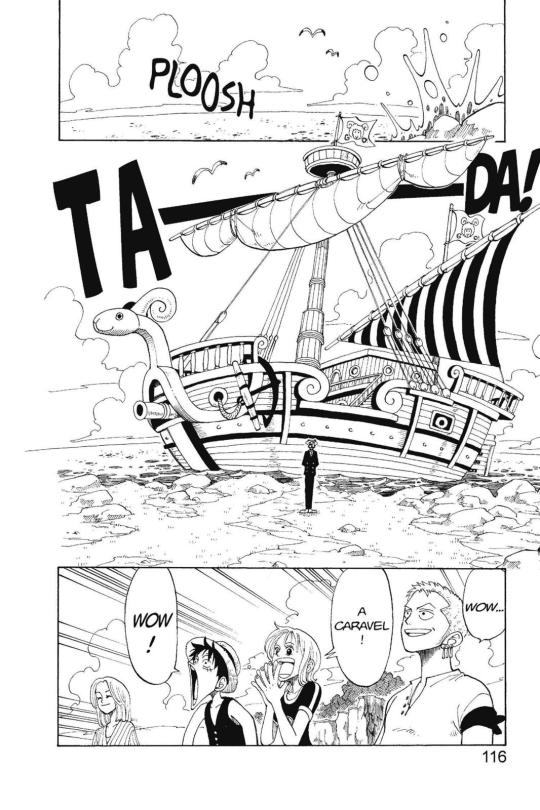
As I mentioned, the introduction of a ship marks a profound change in the way that One Piece works. By giving the crew a means of travel that is sturdier and more reliable than the impromptu vessels they've been relying on so far, they now have something like a "home" as well as a means to make more deliberate decisions about their next destinations.
The world starts to take on a greater shape in some major ways, and most of them are directed towards sparking further intrigue about the Grand Line and establishing it as a credibly wondrous but dangerous place. For example, the existence of non-human species such as fishmen is introduced during Arlong Park, a story element that will have huge ramifications down the line. As another example, we get some more information about Devil Fruits and how they work, most notably by introducing the concept of different Devil Fruit "types." These are later elaborated on as Zoan (animal transformations), Logia (elemental bodies), and Paramecia (kind of a grab bag). We also get Krieg's observation that the Grand Line is practically lousy with Devil Fruit users, which bears out once the Straw Hats encounter Smoker, a now empowered and redesigned Alvida, and Buggy all in the same spot just outside of the Grand Line.
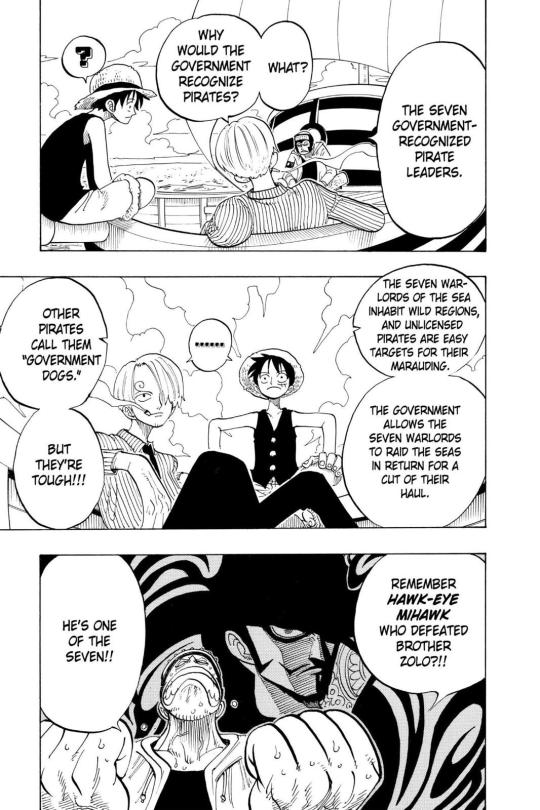
We also learn, by way of Mihawk, about the "Seven Warlords of the Sea" (who going forward I will alternately refer to as the Seven Warlords or the Shichibukai). Again, this shows how outclassed the Straw Hats are by the grander scope of their world, but what it also does is lay down the groundwork for one of the series' central conflicts, and I'd argue its most important: the corrupt and authoritarian World Government.
There's also, notably, a mention of "Three Powers" that control the Grand Line, and what the third one is will go unexplained until almost three hundred chapters later! I noted in the previous post that Oda, unlike someone like Akira Toriyama or Hirohiko Araki, doesn't write by the seat of his pants as much. This was maybe being charitable: instead what I'd say is that Oda rarely cheats. When Oda is backfilling or retroactively adding something, it rarely feels out of place, he usually leaves his mysteries and vague worldbuilding details open to enough interpretation that future explanations maintain their plausibility. This has a dual effect: it adds more fantastical details to the world, fitting as the crew gets closer to the super-fantastical Grand Line, but it also drives home how underprepared the crew is for some of the dangers they're going to encounter.
Another, smaller way that the world starts expanding in scope is the introduction of the "cover stories," many of which anime fans will miss out on. These are used not just to add fun details but to meaningfully flesh out later plot points. We get one story which documents the aftermath of Buggy's defeat which sets up his and Alvida's presence in Loguetown, and another about Coby's early days in the Marines that foreshadows important characters and points towards major growth for him.
The locations also take a step up from the somewhat dull environs of Shells Town and Syrup Village (I'm kind of an Orange Town defender now). The Baratie, for instance, is a delightfully charming setting that is fun to experience both when it's working as normal and when it turns into a combat zone. Arlong Park has a distinct geography and unique setting details like paddy fields, pools, and a Sea King that really make it feel dynamic and lived-in in a way that Syrup Village simply doesn't. Also, I believe it's the first time that Oda starts doing little maps as the characters plan out their next moves, which really helps ground the action and give an idea of how the setting works.
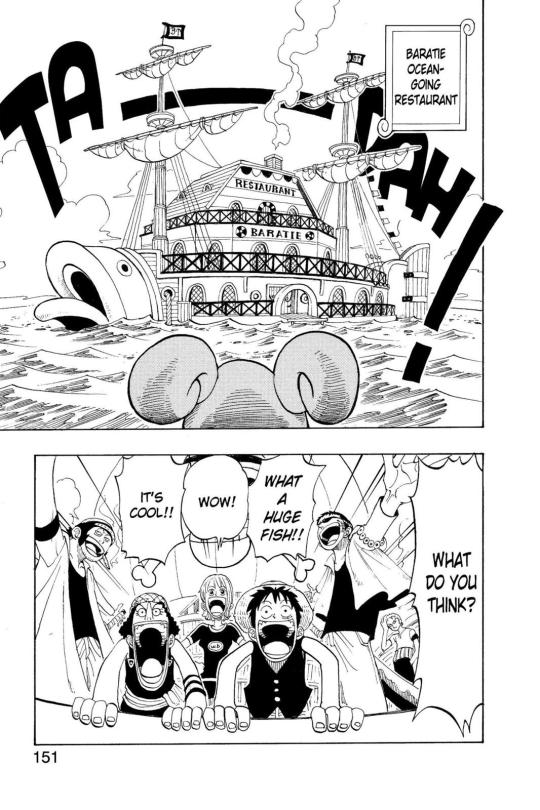
So, overall, this is actually one of my favorite segments of the early story. I think it clears away some of the growing pains of the early chapters, and shows that other aspects weren't in fact growing pains at all. It also introduces just an absolute mountain of motifs, characterization points, and setting details. This second half of East Blue is an excellent demonstration of the two things that Oda frequently excels at: an epic adventure full of fantastical things and places, and slow-burn character development for an ensemble cast. Additionally, the Romantic themes have started to lock into place: the ability to reshape the world through strength of will and commitment to one's convictions. Finally, I think Oda's artwork is steadily improving, though his extremities still need work.
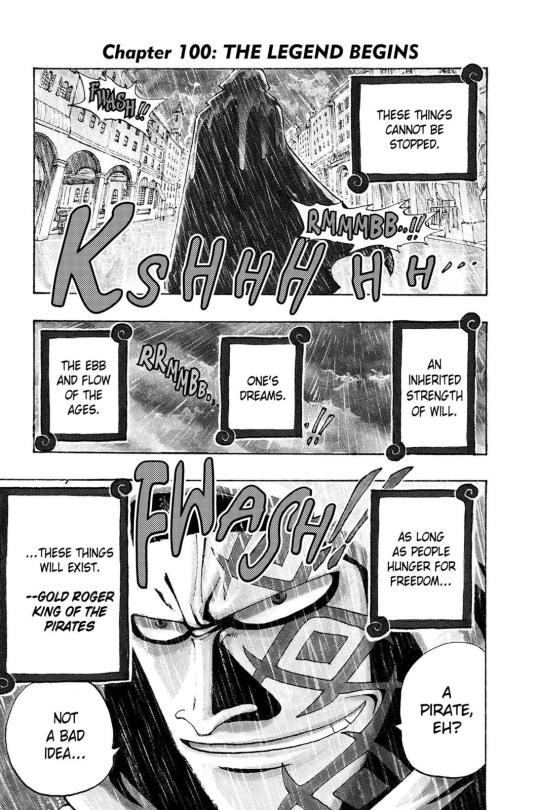
I really like the take that these first 100 chapters form a sort of "prologue" for the series as a whole, since Chapter 100 is called "The Legend Begins," has a very explicit thesis statement, and ends with the crew reaffirming their individual dreams as a collective ritual before they enter the Grand Line.
In terms of the evaluation of each section: Baratie is a solid arc with a couple of things I could nitpick, but it's really carried by how different it feels from what's come before and the strength of Sanji's character arc within it. Arlong Park is one of the most emotionally moving in the whole series, and unquestionably has the best action of the East Blue. Finally, Loguetown is a thrilling cap-off to the first "part" as the series transitions into the next phase of the story: the Baroque Works Conspiracy.
Whew. This was a doozy to write, and to some extent it's possible I would have been better served dividing these arcs up to focus on them each in more detail...but here we are!
33 notes
·
View notes
Text
i think one of the other autistic aspects in jacks character that’s like a little hard to see unless you’re also autistic, because it’s more of a common experience than a visible trait, is the sensitivity he has to people perceiving him as “different.” like, yes he actively wants to be strong and protect people and embrace his powers/what he is for a good purpose, and he even likes to show off and impress or entertain people with them. yes he’s well aware of his capabilities + Most Powerful Being status and literally weaponizes it against their enemies, but then at the same time he’s extremely uncomfortable when people regard him as “different” or dangerous, despite him knowing and owning that in other areas.
when mrs butters says that sam and dean should be afraid of jack bc of how insanely powerful he’s become, he never argues against his power level, only that he’d never hurt them; again, he knows his strength and uses it against various enemies even proudly sometimes. a large part of his character is just grappling with what he is and accepting that, which in turn ties into using it for Good to fight the Evil that’s supposed to be inherent to it. au bobby almost has him thrown out of the camp because he’s a “half breed” who will “inevitably” turn on the humans there because of it, and later on rationalizes that jack must be fully evil now because without his human side (a literal biological aspect that can’t be taken away), all that’s left is Lucifer. jack is essentially feared for being half-angel and looked down on for being half-human, for literally being a lesser human being because his other heritage isn’t human.
while jack obviously embraces their human heritage more, they do also make some effort to accept their angelic heritage for what it lets him do. suffice it to say, “this is who i am and I can’t change it but I can do something with it.” so then, when people view him as something weird or dangerous or simply different, when they see him negatively while he’s actively struggling to make positives out of it, he doesn’t deal with it very well. he strives to be “normal,” while still maintaining the protective role he’s able to fill specifically because he isn’t normal.
and for me, the autistic parallel lies in that directly. the more I’m realizing about myself and my autistic identity, the more I’m able to understand myself and embrace it—and even though my family jokes here and there, they also embrace me and help me feel more comfortable and confident in who I am. but it still feels like almost every day, I’m going through loving myself, messing up because I’m autistic, hating that I’m autistic and stuck like this forever, and learning to love myself again despite my faults. wash rinse repeat. as I become an adult and have increasing responsibility and pressure that I’m unable to take on because I’m autistic, I resent that the world isn’t built for me; that it actively hates and mocks me. countless tiktok core-core videos about how I am fundamentally a lesser human being or not even human to allistics, just because I am autistic. I flip back and forth all the time between “I hate being autistic because I struggle like this and I’ll never stop struggling” and “I love being autistic and I wouldn’t be me if I wasn’t but I hate how difficult the world is because of it.”
and honestly both can be true; I don’t enjoy the executive dysfunction and exhaustion I’d deal with even in an ideal non-ableist society, but I enjoy being able to have special interests and experience certain things in a unique way. and conversely, jack likes being able to protect their loved ones and do cool tricks with their angel powers, but they don’t like being rejected or othered by everyone else because he’s half-angel. self acceptance is incredibly difficult to maintain when you aren’t outwardly accepted, and it’s even worse when you’re actively rejected—which true for anyone, but especially in the autistic experience. and again, even if the world was accepting of autistic people, I would still probably struggle to accept myself personally because of the ways it disables me. in that same way, even tho jack is (mostly) surrounded by people who accept him as he is and are equally as weird or “monstrous,” he still feels ostensibly Different from them and is actively othered from them by heaven and hell and dean in 15x18 arguing about his True Place.
another layer of this is that, even jack’s supportive accepting equally-weird family has their moments of othering him without meaning to; he is fundamentally dangerous [against his will], and they’re not being unreasonable when they’re afraid. i think dean even frames it as, “we aren’t afraid of you, we’re afraid of what you can do to other people,” which means to separate jack’s inherent dangerousness from their personhood, when jack so easily conflates the two (and even that itself can be seen as separating your symptoms/behaviors from your personhood).
a lot of dadstiel ppl might be mad at this, but even cas has the tendency to impose Jack’s value with the paradisal destiny Kelly told him about, despite also saying that Jack only needs to be himself to be loved. neither his or Kelly’s love are conditional on that basis, but it inadvertently created a standard for jack to hold themself to and is part of the reason he seeks to make Something Good out of what he’s been taught is Inherently Bad. he’s expected to succeed and actively wants to, but because their natural tendencies for retaliation or anger or impulsivity (things they view as inherently evil in them), as well as their lack of total control, causes jack to falter in fully succeeding and ergo, continue the struggle to love himself on the basis of meeting cas and kelly’s accidental standard.
it’s not their fault and it isn’t Jack’s fault either, because it’s all fundamentally a matter of genetics and circumstance, but it’s obvious to anyone alive that’s ever struggled with self consciousness and esteem that it’s hard to love yourself when the love you receive from others seemingly falters in a specific area, because then you fixate on the area where their love falters and you either strive to fix it or spiral into a crisis that there will always be some aspect of you that isn’t lovable.
thank you for coming to my ted talk.
#spn#spn analysis#supernatural#jack kline#autistic jack kline#autistic characters#autism coded#autistic experiences#autism posting#sam winchester#dean winchester#castiel#tfw 2.0#dadstiel#cas and jack#kelly kline#liek … He means so so so so so so so so much to me I’m gonna throw up#he’s literally peak autism representation in almost every way and it’s literally not even on purpose . it just IS#autism transcending the narrative …
37 notes
·
View notes
Note
post/734733274896809984/do-you-ever-worry-your-own-writing-might-come-off that makes sense. i was asking because i'm afraid of accidentally writing misogyny myself and i kind of admire what you do
Hmm... I wish I had better advice to give you on this front, but honestly, the only thing I can tell you is to consider the perspective of your female characters.
Women are people. They have thoughts and feelings of their own, so like... just let them have their own arcs. A lot of the worst misogyny in WC comes from the way that the writers just don't care about their girls (or, in the case of tall shadow, actually get undermined and forced to rewrite entire chapters), so they're not curious about their lives, or WHY they feel the way they do or what they want, or any direction for their character arcs.
Turtle Tail as an example. She'll often just end up feeling whatever Gray Wing's plot demands. She's gotta leave when Storm dumps him to make him feel lonely. She shows up again to love him in the next book. Lets her best friend Bumble get dragged back to Tom the Wifebeater, but is sad enough about her death to be "unreasonably angry" with Clear Sky, and then calms down and accept Gray Wing is right all along.
And then she dies, so he can have his very own fridge wife.
In this way, Turtle Tail's just being used to tell Gray Wing's story. They're not interested in why she would turn on Bumble, or god forbid any lingering negative feelings for how she didn't help her, or even resentment towards Clear Sky for killing her or Gray Wing for jumping to his defense. She isn't really going through her own character arc.
She does have personality traits of her own, don't misunderstand my criticism, but as a character she revolves around Gray Wing.
So, zoom out every now and then, and just ask yourself; "Whose story is being told by what I wrote? Do my female characters have goals, wants, and agency, or are they just supporting men? How do their choices impact the narrative?"
But that's already kinda assuming that you already have characters like Turtle Tail who DO have personalities and potential of their own. Here's some super simple and practical advice that helped me;
Tally the genders in your cast. How many are boys, how many are girls, how many are others?
And take stock of how many of those characters are just in the supporting cast, and compare that to the amount you have in the main cast.
If you have a significant imbalance, ESPECIALLY in the main cast, fire the Woman Beam.
It's a really simple trick to just write a male character, and then change its gender while keeping it the same. I promise women are really not fundamentally different from men lmao. You can consider how your in-universe gender roles affect them later, if you'd like, but when you're just starting to wean yourself off a "boy bias" this trick works like a charm.
Also you're not allowed to change the body type of any girl you Woman Beam because I said so. PLEASE allow your girls to have muscles, or be fat, or be old, or have lots of scars. Do NOT do what a cowardly Triple A studio does, where the women all have the same cute or sexy face and curvy body while they're standing next to dwarves, robots, and a gorilla.
Or this shit,
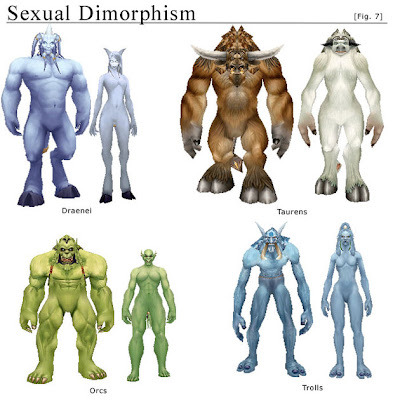
If you do this I will GET you. If you're ever possessed by the dark urge, you will see my face appear in the clouds like Mufasa himself to guide you away from the path of evil.
Anyway, you get better at just making characters girls to begin with as time goes on and you practice it. It's really not as big of a deal as your brain might think it is.
Take a legitimate interest in female characters and try not to disproportionately hit them with parental/romance plots as opposed to the male cast, and you'll be fine. Don't think of them as "SPECIAL WOMEN CHARACTERS" just make a character and then let her be a girl, occasionally checking your tally and doing some critical thinking about their use in the story.
(Also remember I'm not a professional or anything, I'm just trying to give advice)
#I wish I had more succinct and practical advice to give you besides the woman beam trick#Honestly I just kinda feel it out because I like telling stories about girls#I made it fun for myself by clapping and cheering and whooping and hollering whenever a girl does something#because it's not fun to write like a monk in a monastery#With the spectre of Brother Smockbimble looming over your shoulder telling you to Write Perfectly Every Time#Characters aren't real people. You can just fix it if you happen to fuck up or do better next time with what you learned.#Making mistakes is just part of acquiring skill#and writing is an art just like painting or drawing.#So don't make a fun OC project into homework! You should be enjoying making your own art! Express yourself!#Please understand that when I'm ripping into the series I'm being so harsh because it's bestselling corporate media#Read by HUNDREDS of thousands of kids worldwide#Raking in millions of dollars a year. Written by a TEAM of professionals.#So I have higher expectations of it than of a fandom rando on the internet. Or even a self-published author who's just One Guy.#Hence why I'm infinitely more charitable to Ratha than I am to Battle Cats#bones gives advice
114 notes
·
View notes
Text
One thing I've found super helpful in writing characters is thinking about what is most fundamental to their character. If you take everything away from them, at their core, a few emotions and a common, overarching theme shows. It doesn't matter if they lose their memory, are down on their knees having suffered the greatest loss of their life (in battle, a loved one, etc.), this trait will stay with them no matter what. If it doesn't, they've betrayed their character, which can be useful for corruption/redemption/distillation arcs.
Let me use an example to illustrate my point.
One of my own characters, Trevor Steele, has the "hand squeeze," a thing that his sister Angela used to do to him when they were young to comfort him from anger or sadness. He remembers this, and uses it to calm others as well as to ground himself sometimes. This trait is so fundamental to his character that taking it away would change him radically.
And I think that is a very important thing to know. Not every character has something this deep, Pure Evil villains in particular don't really need more of a fundamental trait than being evil, but I think it's interesting to explore, for the characters you've created, what their most fundamental aspects are. It can be an object, a person, an emotion, a mindset, themselves, their partner, or literally anything else ridiculously important to them specifically. Does it motivate them? Does it drag them down? Is it healthy or unhealthy? What happens if you take it away? All very interesting questions to explore, even if just for fun.
For more talk about fundamental aspects of characters, but in a more literal sense, I also made this post: https://www.tumblr.com/benjaminrydersnest/732451994465402880/but-maybe-this-doesnt-apply-to-all-of-the
For more writing advice in general, check out: https://www.youtube.com/@OverlySarcasticProductions
They do an excellent series called "Trope Talks" I highly recommend for learning more/improving on writing.
22 notes
·
View notes
Note
can i ask for your thoughts on the netflix atla adaption? 👉👈 value ur opinion on media
aw, thank you!!! i admit i'm only halfway through watching s1, so my opinions may change as i reach the end of the season, but i can outline some of my thoughts so far!
pros:
overall, with a few exceptions, i think the casting so far is really solid. the asian and indigenous representation within the show is something they clearly took very seriously, and it shows! especially for a netflix show, that's something really groundbreaking and important and refreshing to see; and obviously a huge improvement on past whitewashed adaptations. overall, i think most of the effects are good, despite some weird cinematography choices — there are a handful of moments where the CGI looks particularly egregious, but overall, the bending and choreo look COOL. the opening scene of the pilot had me by the throat, even as it made very clear what a different kind of adaptation this would be. overall, i tend not to be too fussy about an adaptation altering things from originals to make more sense in different formats (with caveats, as i'll mention in the cons lol), so i wasn't mad about the way they've fused some of the storylines to make it flow better in a 60-minute format. (although i do question bringing in s2 stories so early, such as the secret tunnel.) there have been some moments where they've either built out character relationships (like zuko and iroh) or brought in supplementary canon from korra and the comics, which i have also enjoyed as a huge fan of the original. there are a few additions that i've really loved and had fun with — zuko's dream journal, for one, lmao, and his and aang's street fight in omashu.
cons:
honestly, my biggest gripe so far has been the alterations to characterization and character motivation. the cast and crew were sort of smugly talking about removing misogyny from the original and "updating" it, which is ironic because i think the live action is actually more sexist in many ways.
my BIGGEST disappointment has been katara, with no shade to the actor. this is one of the characters who means the most to me from the original, and the character that has hands-down been the least recognizable in natla. her fire, her temper, her unruliness, and her bossiness — all to say, her human traits — have been completely sanitized, presumably to avoid drawing any kind of criticism that she's "annoying." her anger is quite literally what kickstarts the entire show: katara losing her temper with sokka cracks open the iceberg that releases aang. katara's anger is, in a lot of ways, an outlet not only for her sense of injustice in the world, but also an outlet for coping with 1) immense colonial trauma and 2) the burden of being parentified. this, in my view, is IMPORTANT for young girls and particularly young girls of color to see — that anger doesn't have to be something you shy away from, but that you can embrace as a weapon of resistance. this anger is missing entirely, except in small snatches, from natla katara. the moments that make katara a flawed, interesting character — such as her stealing the waterbending scroll and getting jealous of aang's natural prowess — have been scrubbed completely. it is nearly impossible, at this point, to imagine this version of katara bloodbending or taking vengeance for her mother in s3. i think the re-characterization is a big misstep, due more to poor writing than anything. even the agency of katara's bending is "unlocked" and coached by male characters like aang (ep 1) and jet (ep 3), when katara is supposed to be the one teaching aang!
the inversion of sokka and katara's relationship — that is to say, parentifying sokka and making katara more of a "little sister" figure — is also a huge misstep IMO, because it misses a lot of the characterization fundamental to katara's arcs in the original, and even her later conflicts with other characters like toph. in s3 in the original, sokka says when he pictures his mother, he can only picture katara's face — this is, again, a central aspect to their dynamic and to katara's character! my guess is that they removed katara's overmothering qualities to avoid accusations of being anti-feminist, but ironically, by not acknowledging that in-text the way the original does, it bakes misogyny unspokenly into the atla world rather than explicitly acknowledging and challenging it. to clarify again, i have NOT seen the end of the season yet — i am curious what they do with katara's confrontation with paku, which is one of the biggest grapplings with misogyny in the original text. but for me, removing katara's motherly qualities/parentification, and above all her unsavory traits, are not accomplishing anti-sexist work the way the writers think they're doing, but rather sanitizing the original's social commentary on gender altogether.
one of my biggest squicks thus far has been suki and sokka's relationship; i saw suki's characterization described by someone here as a farmer girl p*rn trope where a naive village waif looks to a man to show her the outside world, or w/e, and i hate that this is what they did to suki's character. they keep her warrior qualities, yes, but this is undercut for me by the cringe comphet romance tropes of making her a wide-eyed blushing virgin around sokka. the insta-romance in the original makes more sense to me, obviously because of the format, but because in the span of 20 minutes, suki has taught sokka what it is to respect and reevaluate his relationship with women and femininity. the writers bragged about removing this from the natla representation, so what we have now is that suki doesn't really teach sokka anything substantial about himself, other than some moves. rather, it's sokka teaching suki about what it is to be "worldly" and how to unlock carnal desires. tbh, i hate that! lol! but that's just my onion.
zuko has been one of the strongest and most well-acted characterizations by far, but i do have a gripe with how they shifted his primary motivation from regaining his honor to reclaiming the throne. zuko at his essence has never been a power-hungry character. his entire drive, as we are told exhaustively through both the show and memes of the original, is regaining his honor — which is also an important cultural trope for many japanese warrior characters (though others not me can speak far more in-depth to this). his search for lost honor is incredibly important, if not central, to his entire character arc, which is zuko discovering that his honor does not come by acknowledgement from his abusive family or even imperial power, but through his own integrity and ethical code. so to have him make several lines about rightfully regaining what's his, the throne, and to make that the primary point of contention between him and azula.....is a misunderstanding, again, of the crucial aspects of zuko's character.
my other nitpicks with the characters are smaller — i miss sokka's slapstick, which has been substituted with very dry humor (and i understand this makes more sense for live action). i am still on the fence about how i feel about making ozai and azula such central characters in s1; i understand why they felt this was necessary for live action, but having those two be shadow figures in the original s1 was a really cool narrative effect for not only establishing zuko initially as a villain within his own right, but for building narrative suspense as to the fire nation's motivations.
ultimately, there's just some secret x ingredient that's missing from the live action that the original nailed effortlessly — maybe it's the sense of fun and wonder? i haven't really had fun watching this adaptation; i'm more just spectating, like watching some pretty fireworks before i move on with my day. my opinion may change slightly, as i hear the show is stronger in the second half; i wouldn't even say it's a BAD adaptation, but overall i feel like it's just kinda....meh, and i still question why it needs to exist in the first place when there are some things that animation as a medium just does far better.
also i just want to point out that i find it extremely frustrating that this show leans very hard into showing the atrocities and Moral Evil of genocide in literally the first 20 minutes of episode 1 and that while netflix wants the virtue-signaling brownie points for that, they'll still continue to give giant paychecks and platforms to brazen zionists. because after this dies down, the stranger things promo cycle is going to start up.
18 notes
·
View notes
Note
One has to wonder if Izuku's propping up of characters that don't deserve his respect has anything to do with him projecting his own heroic mentality onto everyone else. To be honest, this is biggest issue I have with him-he is willing to defend people like Aizawa, Bakugo or Endeavor even though they don't deserve it and expects the same out of others, and I've noticed that he has a tendency to trivialize the past trauma of others if that stops them from being as heroic as he is (all but demanding that Shoto use his fire and later on that he forgive his abuser because HE wouldn't let the fact he was abused for his whole life get in the way of mastering his quirk to become more effective, the whole Nagant fight where he sticks to the hero system even when he has direct evidence of the hero system being fundamentally corrupt and that he was on the wrong side all along, etc).
In my humble opinion, it boils down to him being a mouthpiece for Horikoshi. Bakugou, Endeavor, and Aizawa are characters he wants us to see in a positive light, and what better way to do that than for the main character (a "true hero," at that) to reaffirm their positive traits (Bakugou's strength and ambition, Aizawa being hard on his students because he cares, and Endeavor putting in the work to change).
It's definitely more present in the later seasons. For Bakugou and Aizawa it somewhat makes sense; he's been conditioned to think that Bakugou can do what he wants because he's strong and compared to some of his past teachers, he probably thinks Aizawa is a good teacher. He's desensitized to their behavior because he's been dealing with it for so long. But to extend that same courtesy to Endeavor is... Weird.
I've talked about him claiming that Todoroki's ready to forgive Endeavor before. It felt painfully out of character considering that Izuku said nothing about Endeavor all this time. Not once did he talk about what he thought about Endeavor's actions. But for some reason after 4 seasons, the first thing he does say in this regard is that the victim (his best friend) is getting ready for forgive him. This is even more odd since Izuku himself wouldn't be aware of the progress Endeavor even made. I have no other explanation other than it's Horikoshi's own feelings on the matter being projected onto Izuku.
Nagant, though, I feel is a little different. Izuku sticking to his morals and pushing through to save Chisaki isn't a bad thing. He also never denied that society was corrupt. But he maintains the attitude that if he keeps on doing the right thing for everyone else he can ebb the problem away. That was kind of the point of Dark Deku (albeit, executed horribly). And that's why Nagant accepted defeat (and later helped the heroes). She realized that if Izuku can keep his morals in such a toxic society, then all hope wasn't lost and that she shouldn't give up on the world. Missed opportunity for her to pursue Izuku a little longer, it would have been great for his character to have her really influence him and his thinking.
(Izuku should absolutely acknowledge the faults of society more than he does though in canon. Especially considering he was a victim of it. But if he does, he's no longer in a place where he can justifiably prop characters like Bakugou and Endeavor. And without Izuku as a mouthpiece, Bakugou doesn't really have a leg to stand on in terms of redemption)
I don't think him wanting Todoroki to use his fire had anything to do with Todoroki's worth as a hero. That was the guise Izuku used to get through to him because it was what Todoroki based his worth off of. In actuality, Izuku was encouraging Todoroki to take autonomy for the power he was born with and not to allow Endeavor to corrupt that aspect of him. Todoroki was holding himself back; not in terms of power but im terms of healing. And Izuku knew that.
You could make the argument that he was being insensitive. It's entirely valid. But I think he and Tododoki understand one another in ways that others don't. Todoroki understood Izuku's intention, which was why he responded positively to it.
(It's actually a very nice contrast to Bakugou trying to goad him into using his fire. Izuku's intentions are selfless and meant to help Todoroki, Bakugou's are selfish and somewhat mirror what his father wants. He's able to use his fire against Izuku because he knows that there's no ulterior motive behind Izuku's actions, he genuinely wants to help. Whereas Bakugou just wants to prove he's stronger and has zero consideration or sympathy for what Todoroki went through)
#anti bakugou katsuki#mha critical#bnha critical#anon ask#izuku midoriya critical#kind of?#anti enji todoroki
36 notes
·
View notes